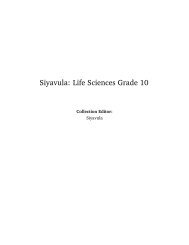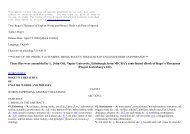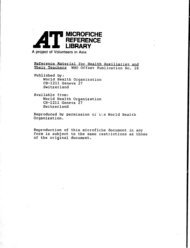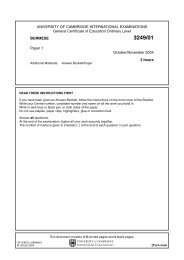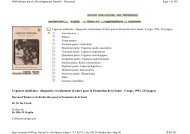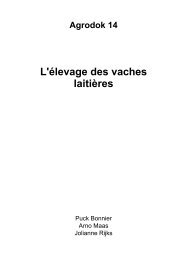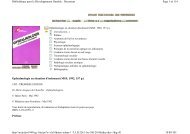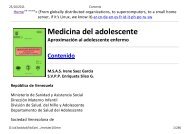Small Decentralized Hydropower Program National ... - Cd3wd.com
Small Decentralized Hydropower Program National ... - Cd3wd.com
Small Decentralized Hydropower Program National ... - Cd3wd.com
Create successful ePaper yourself
Turn your PDF publications into a flip-book with our unique Google optimized e-Paper software.
Necesidades Institucionales<br />
Carlos E. Quevedo<br />
Se planitkan 10s proyectos de electrificacicin rural<br />
de1 Ecuador, que emplean pequenas centrales hidro-<br />
electricas, en un contexto de sus relaciones institu-<br />
cionales a fin de poder utilizar todos 10s recursos<br />
disponibles para asegurar el exit0 de1 proyecto.<br />
Carlos E. Quevedo presenta estas relaciones,<br />
destacando la distincion entre las instituciones de<br />
organization y las funcionales en el desarrollo de las<br />
pequenas centrales hidroelectricas en el Ecuador.<br />
Intrsduecih<br />
El presente trabajo tiene por objet0 analizar 10s<br />
requerimientos institucionales, que sustenten la<br />
diseminacion de microcentrales hidraulicas en el area<br />
rural. El trabajo se refiere particularmente a<br />
Ecuador, sinembargo, las consideraciones que se<br />
establecen, son aplicables a multiples pakes en<br />
desarrollo.<br />
Metodologia<br />
Se establece un marco teorico, para el anahsis y<br />
este procede, a partir de la exploration de la<br />
naturaleza de las actividades que conforman el pro-<br />
grama de desarrolio (Figura 1).<br />
Marco Tebrico<br />
Consideraciones Semhnticas<br />
El termino “institucibn” tiene multiples<br />
significados. En el presente trabajo se utilizaran dos<br />
de ellos, que se diferenciaran mediante 10s sufijcs 1<br />
Y 2.<br />
Institution 1 representa una sociedsd con obje-<br />
tivos y normas de action preestablecidas (in-<br />
stitucion privada, publica, etc.) y constituye un su-<br />
jeto de action.<br />
Institucidn 2 representa un mecanismo operativo,<br />
usualmente intangible, y Fuede ser legal, contrac-<br />
tual, tknico, etc. Ejernplos, un convenio en el que<br />
se establecen actividades por ejecutar y respon-<br />
sabilidades, un manual ticnico de disefio, un<br />
manual de mantcnimiento de una maquina, etc.<br />
Carlos E. Quevedo<br />
Rural electrification projects in Ecuador<br />
employing small hydro are planned in a context<br />
of institutional relationships to make use of all<br />
possible resources and to ensure project suc-<br />
cess. Carlos E. Quevedo presents these relation-<br />
ships, drawing the distinction between organiza-<br />
tional and functional institutions that are<br />
involved in the development of small hydro in<br />
Ecuador.<br />
Introduction<br />
The purpose of this paper is to analyze the in-<br />
stitutional requirements which would support the<br />
dissemination of microhydropower plants in rural<br />
areas. Although the paper refers particularly to<br />
Ecuador, the premises established are applicable<br />
to other developing countries as well.<br />
Methodology<br />
A theoretical framework is established for the<br />
analysis and uses as a point of departure from<br />
exploration of the nature of the ac!ivities which<br />
conform to the development program (Figure 1).<br />
250<br />
Theoretical Framework:<br />
Semantic Corusiderations<br />
The term “institution” has multiple definitions.<br />
In this paper we will use two of them, grouping<br />
them in subtypes 1 and 2.<br />
Institution 1 represents a society with objec-<br />
tives and pre-established activity policies<br />
(private institution, public institution, etc.) and<br />
constitutes a subject of activity.<br />
Institution 2 represents a functional<br />
mechanism, usually intangible, and may be<br />
legal, contractual, technical, etc: for example,<br />
an agreement establishing activities to be im-<br />
plemented, responsibilities, a maintenance<br />
manual for a machine, etc.


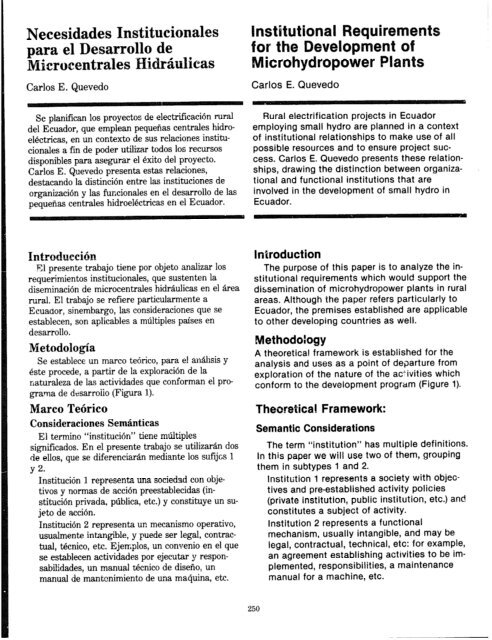
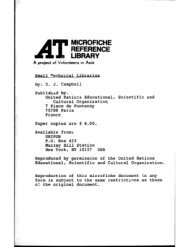
![Mum, int. [man] - Cd3wd.com](https://img.yumpu.com/51564724/1/190x134/mum-int-man-cd3wdcom.jpg?quality=85)
